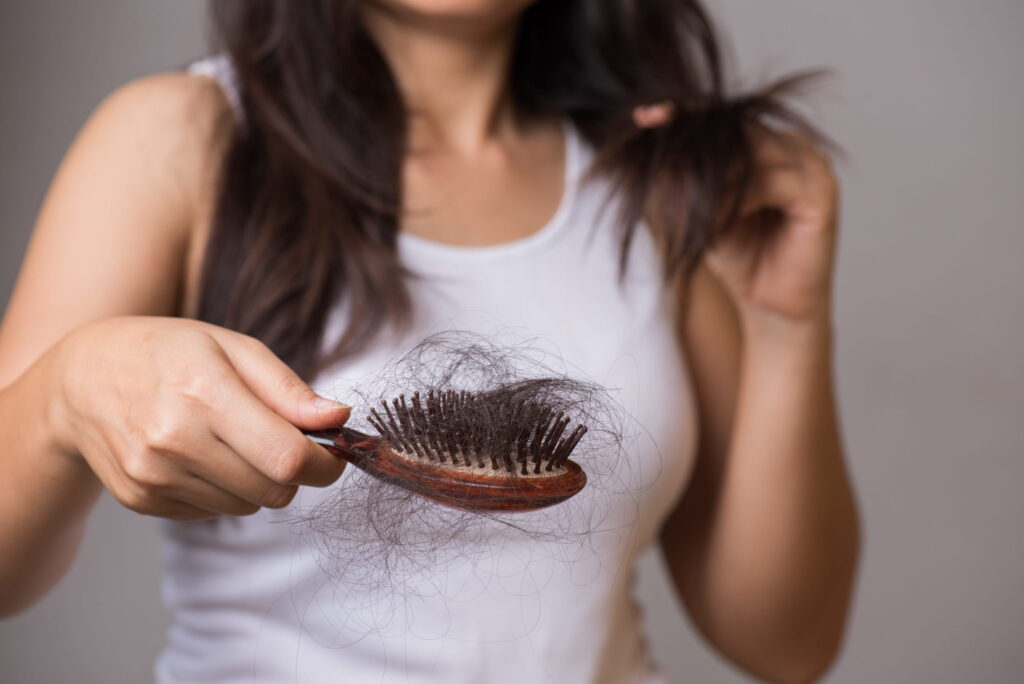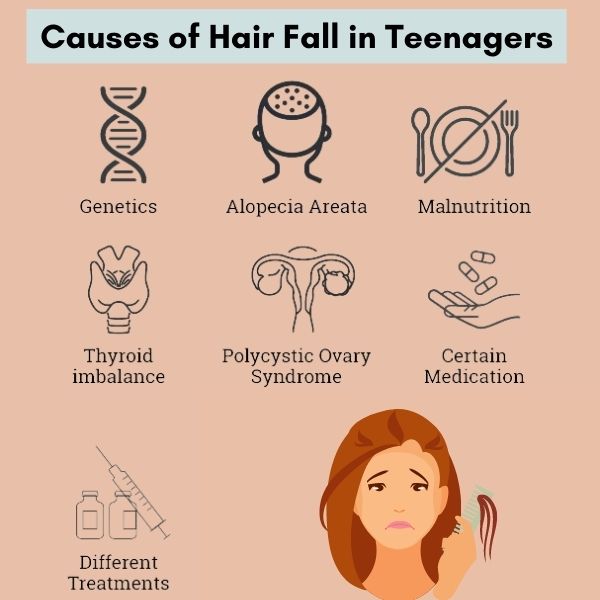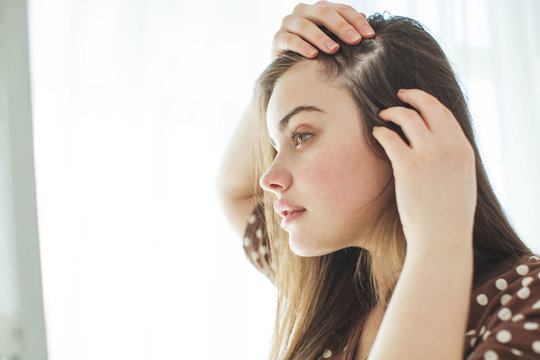Hair loss, a condition traditionally associated with adults, is progressively becoming a concern for the younger generation. Teenagers, already navigating the complex journey of adolescence, are confronting the added challenge of hair loss.
This unexpected change affects their appearance and can have profound psychological effects during these formative years.
Understanding the causes of hair loss in teenagers is imperative to finding practical answers and providing them with the guidance and care they require during this vulnerable period. By delving into the underlying causes, which range from lifestyle decisions to genetic traits, we can give individuals affected a sense of hope.
Teenage hair loss treatment requires a comprehensive plan that addresses the condition’s psychological and physiological components. While managing hair loss in teenagers can be challenging, numerous positive steps can be taken.
Strengthening and protecting hair can be achieved with a well-balanced diet high in Vitamins for hair growth, regular hair care routines, and stress relief via exercise and hobbies. Seeking medical guidance for underlying illnesses and discussing with healthcare providers can also lead to successful outcomes.
Understanding Hair Loss in Teenagers

Types of Common Hair Loss in Teenagers
- Androgenetic Alopecia: This hereditary disorder, sometimes called male or female pattern baldness, results in progressive hair loss that usually begins at the temples or crown. Although it is more prevalent in adults, teens can still experience it.
- Alopecia Areata: Abrupt, uneven hair loss is the hallmark of alopecia areata, a condition caused by the immune system mistakenly attacking hair follicles. People of all ages, even teenagers, can be affected by it, and in severe cases, it can result in complete baldness.
Understanding these aspects of teenage hair loss lays the foundation for exploring its causes, symptoms, and appropriate interventions.
Common Causes of Hair Loss in Teenagers

It will assist readers in comprehending the different causes of teenage hair loss. Specific causes can be treated temporarily, while others could need ongoing care. Encouraging teenagers to seek expert medical assistance for diagnosis and treatment is critical.
Help teenagers handle stress by using relaxation techniques such as yoga, meditation, deep breathing exercises, or hobbies they like. It is crucial to promote stress reduction techniques because long-term stress has been linked to hair loss.
Identifying Signs and Symptoms Hair Loss in Teenagers
Management and intervention are required for the symptoms and indicators of teenage hair loss. This part addresses the outward manifestations of hair loss, the psychological and emotional toll it has on young people, and the need of identifying hair loss early and seeking medical attention:
Physical Signs of Hair Loss:
Emotional and Psychological Impact on Teenagers:
Importance of Early Detection and Aspiring Medical Advice:
By being vigilant of these signs and symptoms, teenagers and their caregivers can address hair loss promptly, minimizing its impact on physical and emotional well-being.
Diagnosing Hair Loss in Teenagers
When to Consult a Physician Teens should consult a doctor if they experience hair loss and notice abnormal patterns, rapid shedding, or other symptoms like weight gain, muscle weakness, sensitivity to cold, or ongoing fatigue. An early diagnosis and treatment can help determine the cause of the hair loss and get the right course of action.
Types of Medical Professionals to Consult A dermatologist specializing in skin, hair, and nail diseases is the best medical expert to see regarding hair loss. Dermatologists are highly knowledgeable about the many reasons for hair loss and have treated them with expertise. Additional experts who could be involved are:
- Trichologists: Experts in hair and scalp issues
- Endocrinologists: For hair loss related to hormonal conditions
- Nutritionists: Dietary deficits are thought to be the cause of hair loss.
Common Diagnostic Tests and Procedures Teenage hair loss can be diagnosed using several diagnostic techniques and assays, such as:
- Blood tests: To uncover medical conditions or nutrient deficiencies that can cause hair loss
- Pull test: The number of hairs that come out when a doctor carefully pulls several dozen hairs helps identify the stage of the shedding process.
- Scalp examination: Using a microscope to examine the scalp
- Scalp biopsies: In certain instances, to rule out more serious illnesses.
It’s crucial to remember that the precise tests and procedures will vary depending on the patient’s symptoms and medical background. The objective is to identify the cause of hair loss and create a successful treatment strategy.
Medical Consultation: If hair loss persists and creates substantial concern, seek expert counsel and treatment alternatives.
Treatment and Management for Hair Loss in Teenagers
- Medical Treatments
Options for Medical Treatments for Adolescents Losing Hair Various medical interventions can be contemplated, with due consideration to age-appropriate interventions:
- Nutritional and Lifestyle Changes for Hair Health
Modifications to Diet and Lifestyle for Hair Health The health of your hair can be greatly impacted by a diet rich in essential nutrients. The following modifications could promote hair growth:
Besides modifying one’s diet, hair health can be preserved by minimizing heat style, removing harsh chemical treatments, and shielding hair from the sun.
- Coping Strategies for Psychological Well-being
Adaptation Techniques for Emotional HealthTeenagers who experience hair loss may experience severe psychological effects. The following coping mechanisms can be used to manage the emotional aspects:
Remember, the journey to coping with hair loss is personal and unique to each individual. Finding what functions best for you and seeking professional help is essential.
Meditation, exercise, adequate sleep, and relaxation can help manage stress-related hair loss.
Preventive Measures

- Tips for Maintaining Healthy Hair and Scalp
Maintaining healthy hair and scalp is essential for preventing hair loss in Teenagers. Here are some tips to help you keep your hair and scalp in top condition:
- Importance of Early Detection and Treatment
Early detection and therapy of hair loss is crucial for several reasons:
By following these preventive measures and understanding the importance of early detection and therapy, individuals can take proactive steps to maintain their hair health and address any issues promptly.
Urge teens to eat a healthy, balanced diet that includes plenty of iron, zinc, vitamin D, and protein—all of which are important for healthy hair. Highlight the significance of eating an abundance of whole grains, fruits, and veggies.
Conclusion
Hair loss in teenagers is a multifaceted issue that requires a compassionate and informed approach. We’ve explored the various causes, from genetic factors to lifestyle influences, and underscored the importance of early diagnosis and comprehensive treatment. Teens and their guardians must understand that hair loss is not just a cosmetic concern but can indicate underlying health issues.
We encourage teenagers experiencing hair loss to adopt a proactive approach to their hair health. This includes maintaining a balanced diet, practising gentle hair care, and being vigilant about changes in their hair and scalp. Moreover, psychological support should not be overlooked, as the emotional well-being of teens is paramount during this challenging time.
Lastly, we urge those affected by hair loss to consult with healthcare professionals. Dermatologists, trichologists, and nutritionists can provide valuable insights and tailored treatment plans. Remember, the journey to overcoming hair loss is not one to embark on alone—professional guidance can make all the difference.
Remember that every teen deserves to have their tale acknowledged and encouraged, and every hair reveals a story. With the correct information and tools, we can contribute to starting a new chapter of confidence and wellness.
FAQs for Hair Loss in Teenagers
What are the most common reasons for hair loss in teenagers?
Several things, such as hormonal changes throughout puberty, genetic predispositions, stress, malnutrition, medical diseases like thyroid disorders, infections of the scalp, and environmental causes like over-styling or harsh hair treatments, can cause teenage hair loss.
Is it normal for teenagers to experience hair loss?
Although some hair loss is average for teenagers, abrupt or severe hair loss could point to a more serious problem. Various factors, including heredity, stress, hormone swings, and poor nutritional intake, can cause adolescent hair loss.
Can hair loss in teenagers be reversed or treated?
Managing or treating hair loss in teenagers is often possible, contingent upon the underlying cause. Changes in lifestyle, good hair hygiene habits, over-the-counter or prescription medications like finasteride or minoxidil, complementary therapies like essential oils or scalp massages, and expert interventions like PRP or laser therapy can all help promote hair growth and halt further loss.
When should my teenager see a healthcare professional for hair loss?
If your adolescent is experiencing ongoing or worsening hair loss, you should take them to see a dermatologist or other healthcare provider for a thorough assessment. Prompt identification and action can enhance therapeutic results and stop further hair loss.
Are there any particular medical disorders that can lead to teenage hair loss?
Yes, certain medical conditions can contribute to hair loss in teenagers. These may include thyroid disorders (hypothyroidism or hyperthyroidism), scalp infections (such as ringworm), autoimmune conditions (like alopecia areata), and hormonal imbalances.
Can stress or anxiety trigger hair loss in teenagers?
Indeed, teenage hair loss can be significantly influenced by stress and anxiety. Prolonged stress can interfere with the hair growth cycle, causing telogen effluvium and significant hair loss. Promoting stress-reduction methods like yoga or counselling may lessen the effects of stress-related hair loss.
Are there any natural remedies or supplements that help with teenage hair loss?
Some natural remedies and supplements may support hair health and growth, although scientific evidence supporting their efficacy is limited. These may include biotin, vitamins (such as vitamins D and E), omega-3 fatty acids, and herbal supplements like saw palmetto or ginseng. It’s essential to consult a healthcare specialist before using natural medications or supplements, as they may interact with drugs or have potential side effects.
Is hair loss in teenagers always permanent?
Teen hair loss can be temporary or permanent, depending on the underlying cause. Conditions like telogen effluvium, often triggered by stress or nutritional deficiencies, typically result in temporary hair loss, with hair regrowth occurring once the underlying cause is addressed. However, certain genetic conditions like androgenetic alopecia may lead to progressive hair loss, requiring ongoing management to slow down or stabilize hair loss.

